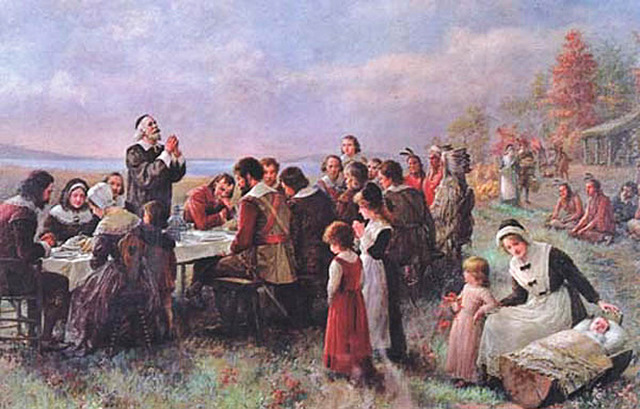
Happy Thanksgiving! I am thankful for many things this year. I am thankful for a wonderful, loving family, friends that I can count on, new challenging opportunities in my life, turkey, basketball, and the fact that I live in the greatest country that ever existed. And much like the Pilgrims that first celebrated Thanksgiving, I am thankful for the lessons of capitalism. Jennifer James of the Kid's Reading Room at the L.A. Times inspired me with her great story on this topic.
When the Pilgrims landed at Plymouth Rock in December 1620, in addition to seeking religious freedom, they intended to create a communist paradise. They had initially landed north, but after skirmishes with Indians they moved down the coast. When they got to Plymouth, they were greeted by friendly, English-speaking members of the Wampanoag tribe who had friendly relations with the English fisherman that fished off of that coast. (They might have kept going south, but they were out of beer.) The Wampanoag taught them how to farm corn, and when Spring arrived, they went right to it. They set up a system where each family would grow what they could, it would be put into a common storage, and then they would be rationed enough food to survive. Unfortunately, it didn't work very well. Despite the famous Puritan work ethic (roughly half of the Pilgrims were Puritan), many didn't work very hard, and they had a poor harvest. Some people starved, some resorted to theft from each other, and no one had enough. The following year, they used the same system with the same result. Sharing was going to kill them.
Finally in 1623, after much prayer and deliberation, the governor, William Bradford, decided to implement a capitalist system. Each family was given their own plot of land and told that they could keep whatever they grew and profit from it. It was a resounding success. Here are Governor Bradford's observations:
This had very good success; for it made all hands very industrious, so as much more corn was planted than otherwise would have been by any means the Gov. or any other could use, and saved him a great deal of trouble, and gave far better content.The Pilgrims were incredibly thankful for their prosperity, and were able to share with their Wampanoag friends for the first time. They had a great feast to celebrate and give thanks, and the Wampanoag were amazed by the production. They had enough to make it through the winter with plenty, and prosperity in the English settlements in America had begun. It is a lesson for which we can all be thankful.
The women now went willingly into the field, and took their little ones with them to set corn, which before would allege weakness, and inability; whom to have compelled would have been thought great tyranny and oppression.
By this time harvest was come, and instead of famine, now God gave them plenty, and the face of things was changed, to the rejoicing of the hearts of many, for which they blessed God. And the effect of their particular [private] planting was well seen, for all had, one way and other, pretty well to bring the year about, and some of the abler sort and more industrious had to spare, and sell to others, so as any general want or famine has not been among them since to this day.
No comments:
Post a Comment